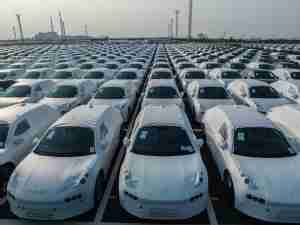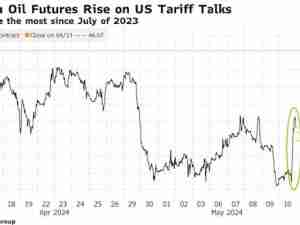Trump’s Boycotts Could Cause Real Economic Harm: Paula Dwyer
By: Paula Dwyer | Feb 26 2016 at 09:30 AM | International Trade
For a candidate who promises to make America great again, Donald Trump has a funny way of showing it. By calling for consumer boycotts of products sold by Apple, Macy’s, Nabisco and the entire country of Mexico, he seems to be doing his level best to achieve the opposite. In Thursday night’s debate, Trump added Ford to his longer list of corporate miscreants.
A Trump tirade may have a minimal effect on a company’s sales, exports and jobs. But if he wins the presidency, these threats could cause real economic harm, even if the rule of law blocks him.
Imagine this scenario: President Trump officially declaresthat China is artificially keeping its currency from rising against the dollar, as a way to boost exports and rob America of jobs. But this doesn’t allow him to impose sanctions, such as steep tariffs on Chinese imports. It puts the ball in Congress’s court to consider higher tariffs if China refuses to adjust its exchange rate. A deeply split Congress, however, fails to go along because higher tariffs would result in higher prices for American consumers.
At that point, a frustrated President Trump goes above Congress’s head and calls for a boycott of Chinese imports. That sets off an economic war with the U.S.‘s most important trading partner and sends corporate earnings and the stock market into a downward spin.
Far-fetched? Not judging by the behavior of candidate Trump. It seems the more he threatens boycotts, the more popular he becomes. The day before the South Carolina primary, he called for retaliating against Apple, the U.S.‘s (and the world’s) most valuable corporation, for refusing to comply with a federal court order to unlock the iPhone of the shooter in the San Bernardino rampage. “I just thought of that,” Trump said at a campaign stop. “Boycott Apple.”
The company was already on Trump’s enemies list for making its products in China. In January, he said, “We’re gonna get Apple to start building their damn computers and things in this country, instead of in other countries.” Yet if Apple refused to make iPhones in China, the Chinese government might not let Apple sell its phones there, shutting it out of its biggest market.
Trump has also urged a boycott of Starbucks (which has roughly 23,000 stores, about 13,000 in the U.S.) because he was livid that it chose a minimalist red design for holiday season cups over traditional scenes.
He took offense too when Macy’s stopped selling his dress shirts, neckties and cuff links last summer after he called Mexican immigrants rapists and drug dealers:
Twitter: Donald J. Trump on Twitter
Macy’s acted after MoveOn.org collected 700,000 signatures on a petition within days of his remarks about Mexicans, putting the company in the position of losing business to Hispanic customers or to angry Trump fans.
Then there’s his boycott of Fox News, over what he considered unfair treatment by moderator Megyn Kelly in the debates.
Trump even issues pre-emptive warnings, as he did to Boeing in South Carolina. The company has invested billions in a North Charleston 787 Dreamliner plant, which employs about 8,000 workers. Boeing shows no signs of wanting to move production to China, yet Trump warned that South Carolinians would wake up one day and read “that Boeing is going to leave South Carolina, they’re going to make all their planes in China.” Why? “Because that’s what they do,” he told a rally. “It’s not going to happen if Trump is president, that I can tell you.”
Trump’s first boycott diktat as a candidate was against Nabisco, after the company said it was planning to make his beloved Oreos in Mexico. “I’ll never eat them again,” he vows. Trump incorrectly said the move would cost 2,000 jobs (the actual number was more like 600). He also said the Chicago plant that makes them would close (it remains open).
Mexico also “just took Ford,” Trump claimed during Thursday night’s debate. “They’re building a $2.5 billion plant,” he said, even though Ford long ago revealed plans to invest in existing Mexican engine and transmission units. Ford has also upped its investment in a pickup truck facility in Ohio and moved jobs from Mexico to the Ohio plant, but Trump didn’t mention that.
Entire countries are in Trump’s sights. He called for a boycott of imports from Mexico after the July prison escape of drug lord Joaquin “El Chapo” Guzman (he has since been captured). “It’s a corrupt place,” Trump said in a radio interview. “The problem we have is that the government of Mexico is outsmarting our government, whether it’s trade or at the border.”
On Thursday night, he took after Carrier, the United Technologies Corp. unit that manufactures air conditioners, for its plan to move production to Mexico from Indiana. Trump didn’t threaten a boycott, but he said he would tell the company he’d “get consensus from Congress and we’re going to tax you” 35 percent on every air conditioner.
While Trump’s retaliatory calls may seem indiscriminate, notice that China regularly gets a tongue-lashing, yet so far he hasn’t called for a boycott of its products. Perhaps that’s because his working-class supporters would have to forgo just about everything at Wal-Mart or any other store selling goods at affordable prices.
Turnabout is fair play in politics. Trump’s antagonists call for boycotts of all things branded “Trump.” A Facebook page lists the golf courses, buildings, shopping centers, casinos, clothing and television shows he owns wholly or in part or that bear his name. Calling Trump a “bigoted blowhard of a man,” Patrick Harvie, a Scottish member of Parliament, urges the public to boycott his hotels and golf resorts.
Economic boycotts are usually a liberal strategy. The Alabama boycotts of Montgomery buses in 1955-56 and of Birmingham merchants in 1963 marked turning points in the civil-rights era.
Jesse Jackson, using his Operation PUSH, led a series of boycotts from the 1960s to the early 2000s against Coca-Cola, Kentucky Fried Chicken, 7-Eleven and dozens of other companies that didn’t employ proportionate numbers of, or award contracts to, blacks. Similar efforts were used globally to end South Africa’s apartheid system.
Do Trump’s actions work? At first, Macy’s seemed to have suffered a blow. Between Trump’s July call for a boycott and the start of the 2015 holiday season, its shares fell 40 percent. But Macy’s reported better-than-expected fourth-quarter results on Tuesday, and gave an upbeat forecast for 2016. Its shares jumped 3 percent.
Maybe that’s why on Wednesday Trump renewed his call to boycott Macy’s.
This column does not necessarily reflect the opinion of the editorial board or Bloomberg LP and its owners.
To contact the author of this story: Paula Dwyer at [email protected].








